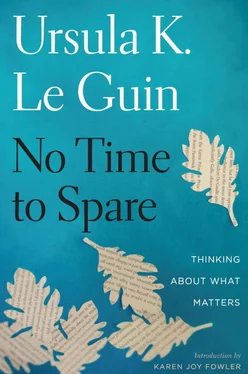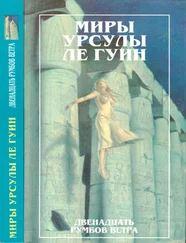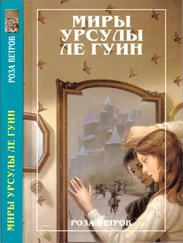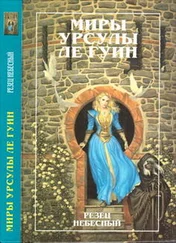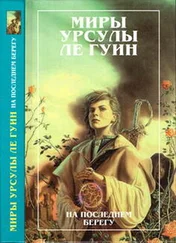As the years went on she seemed to grow shyer and more withdrawn from her friends than she had been, I do not know why. She told me once that she liked coming to work with me because we laughed together.
Her computer began to get out of date, and her life was complicated by various issues; her energy was being overtried. She couldn’t or didn’t want to figure out how to help me with e-correspondence the way she did with paper mail, which she took home along with dictated answers or suggested notes from me. So I came to do all the email and most of the letters, leaving her only some Gimmies and no-thank-yous and those fan letters that needed only acknowledgment.
Delores’s joy in life had been visibly flagging for a long time when she was diagnosed, last year, with cancer. At first it seemed local and curable, but proved to be metastasizing. It killed her in a few months. There was a brief and lovely respite or remission for a few weeks late in her illness, when we were able to visit with her quite often, and laughed together as we had used to laugh. Then the cruel disease closed in again. She died a few months ago, attended with great tenderness by her husband.
I find it extremely hard to talk about people I loved who have died. I can’t now make a proper tribute to that complex and beautiful woman, or say more than that I miss her friendship in every way.
Without her, I’ve had to give up the effort to answer fan mail, at least temporarily. As for the Gimmies, some of them get answered, some of them don’t. I suppose I could hire someone to do that.
But I doubt that I will. I can’t put my heart into it.
July 2011
VISITING VIENNA IN the early 1950s, Charles and I stayed in style for very little expense at the old König von Ungarn Hotel, which had been there since at least the 1820s. We ate breakfast at a café around the corner. Always the same café and the same breakfast: good coffee, fresh fruit, crisp rolls with butter and jam, and a soft-boiled egg. Perfect. Invariable. Every morning.
I don’t know why I got it in my head one morning to vary it, but I did, and when the tall, middle-aged waiter arrived in his impeccable dark coat, I indicated that I wanted the usual breakfast, without the egg.
He appeared not to understand, which, given the quality of my German, was understandable. I repeated something like “Kein Ei,” or “Ohne Ei.”
He responded slowly, in a shaken voice, “Ohne Ei?”
He was disturbed. I was ruthless. Yes, I said, without egg.
He stood for quite a while silent, trying to handle the shock. He visibly forced himself not to appeal, or plead, or show his disapproval. He was a waiter, a disciplined, skillful Viennese waiter, and must obey the most perverse customer. “Without egg, madame,” he said softly, almost unreproachfully, and went away to fetch my eggless breakfast, which he brought and set before me with silent, funereal dignity.
We still laugh recalling that tiny incident of nearly sixty years ago, but it is also kept alive in my memory by a sense of guilt. For one thing, in 1954, in Vienna, an egg meant something. The city was just coming out of very bad times. It was still occupied, divided among the U.S., the British, and the Russian armies; the cathedral had rearisen and the opera house was rearising from the rubble of bombing, but damage and destruction was everywhere, and the effect of privation plain to see in the faces and bodies of people on the street. An offer of food in a city that has gone hungry is not a small matter.
Also, I willfully and needlessly disturbed the order of that waiter’s universe. A very small universe, the Viennese café breakfast, but a stable, orderly, perfected one. Better not change something that has achieved excellence. And it was unkind to demand of a person who spent his working life maintaining that excellence to impair it, to do something he so clearly felt was wrong. After all, I could have let him bring the egg and simply not eaten it. He was far too good at his job to have taken notice, except possibly for a mild, commiserative “Madame doesn’t feel hungry this morning?” To have an egg and not to eat it was my privilege. To refuse to let him bring the egg was to interfere with his privilege, which was to bring me a complete and proper Viennese café breakfast. I still want to laugh when I think about it, and I still feel a twinge of guilt.
The guilt has increased since I began, a couple of years ago, to have a soft-boiled egg for breakfast—to have, in fact, a Viennese café breakfast—every morning. Invariably.
I can’t get those lovely, light, crisp European rolls. (Why do the artisanal bread people in this country think crust should be thick and tough? The more leathery, the more artisanal?) But Thomas’s English muffins are very good, so I have them, with tea, fruit, and a three-and-a-half-minute egg eaten, as in Vienna, from the shell.
To soft-boil an egg I put it in a small pot with cold water to cover, set it on high heat till it boils furiously, take it off at once, turn over the egg timer (a three-and-a-half-minute glass), and start the muffins toasting. When the sand is through the glass, the egg comes out of the water and into the egg cup.
As you see, a certain care and ceremony is involved, which is what I wanted to talk about, and also why the egg cup is important.
If you crack a soft-boiled egg and dump it out into a bowl, it tastes the same but isn’t the same. It’s too easy. It’s dull. It might as well have been poached. The point of a soft-boiled egg is the difficulty of eating it, the attention it requires, the ceremony.
So you put your freshly boiled egg into the egg cup. But not everybody is familiar with egg cups.
In this country they are usually an hourglass shape, with one lobe or bowl bigger than the other. The small end is just big enough to hold the egg. You could eat it there from its shell, but most Americans take it out, turn the egg cup over, crack the egg, and dump it into the larger bowl, where they smoosh it around and eat it.
British and European egg cups don’t offer that option; they have no big bowl; they are just a small china cup on a short pedestal, like a goblet, in which the egg sits upright. You have no choice but to eat your egg out of its own shell. This is where things get ceremonial and interesting.
So you put your freshly boiled egg into the egg cup—but which end up? Eggs are not perfect ovoids, they have a smaller end and a bigger end. People have opinions about which end should be up, i.e., which end you’re going to actually eat the egg out of. This difference of opinion can become so passionate that a war may be fought about it, as we know from Jonathan Swift. It makes just as much sense as most wars and most differences of opinion.
I am a Big-Ender. My opinion, which I will defend to the death, is that if the big end is up it’s easier to get the spoon into the opening created when you knock off the top of the egg with a single, decisive whack of your knife blade. Or possibly—another weighty decision, another matter of opinion, with advocates and enemies, the Righteous and the Unrighteous—you lift the top of the egg off carefully from the egg-encircling crack you have made by tapping the shell with the knife blade all the way round about a half-inch down from the summit.
Some mornings I whack. Some mornings I tap. I have no opinion on the matter. It depends on my mood.
Some elements of the ceremony offer no choice. The knife has be steel, since the sulfur in eggs blackens silver, and the egg spoon must also be untarnishable—stainless steel, or horn. I’ve never seen a gold egg spoon, but I’m sure it would do. Whatever the material, the spoon has to have a small bowl with a fine edge on it: a thick edge can’t coax all the egg white off the inside of the shell. The handle is short, for good balance and easy handling. An egg spoon is a tiny implement that, like the Viennese breakfast, cannot be improved. Like all good tools, it gives pleasure by its pure aptness. It does one thing only, but does it perfectly, and nothing else can do it. Trying to eat an egg from the shell with a normal spoon is like mending a wristwatch with a hammer.
Читать дальше
